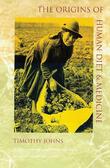Sökning: onr:18225633 > The origins of huma...
- 1 av 1
- Föregående post
- Nästa post
- Till träfflistan
Johns, Timothy: With bitter herbs they shall eat it
The origins of human diet and medicine : chemical ecology / Timothy Johns.
- Johns, Timothy, 1950- (författare)
- ISBN 0816516871 (paper)
- Tucson : University of Arizona Press, [1996]
- Engelska xviii, 356 s.
- Serie: Arizona studies in human ecology
- Bok
Innehållsförteckning
Sammanfattning
Ämnesord
Inställningar
Hjälp
Stäng
- 1. A model of human chemical ecology -- 2. Biological adaptations for dealing with plant toxins -- 3. Technological methods of detoxification -- 4. Domestication as a solution for dealing with plant toxins -- 5. Human perception, cognition, and behaviour in relation to plant chemicals -- 6. Reconsidering the model of human chemical ecology -- 7. Plant chemical defenses as determinants of the human diet -- 8. The ietary basis for the origin of human medicine -- Appendix 1: Classification of traditional plant processing techniques -- Appendix 2: Traditional methods of plant detoxification.
- People have always been attracted to foods rich in calories, fat, and protein; yet the biblical admonition that meat be eaten "with bitter herbs" suggests that unpalatable plants play an important role in our diet. So-called primitive peoples show a surprisingly sophisticated understanding of how their bodies interact with plant chemicals, which may allow us to rediscover the origins of diet by retracing the paths of biology and culture. The domestication of the potato serves as the focus of Timothy Johns's interdisciplinary study, which forges a bold synthesis of ethnobotany and chemical ecology. The Aymara of highland Bolivia have long used varieties of potato containing potentially toxic levels of glycoalkaloids, and Johns proposes that such plants can be eaten without harm owing to human genetic modification and cultural manipulation. Drawing on additional fieldwork in Africa, he considers the evolution of the human use of plants, the ways in which humans obtain foods from among the myriad poisonous and unpalatable plants in the environment, and the consequences of this history for understanding the basis of the human diet. A natural corollary to his investigation is the origin of medicine, since the properties of plants that make them unpalatable and toxic are the same properties that make them useful pharmacologically. As our species has adapted to the use of plants, plants have become an essential part of our internal ecology. Recovering the ancient wisdom regarding our interaction with the environment preserves a fundamental part of our human heritage.
Ämnesord
- Ethnobotany (LCSH)
- Prehistoric peoples -- Food (LCSH)
- Plant toxins (LCSH)
- Traditional medicine (LCSH)
- Chemical ecology (LCSH)
- Etnobotanik (sao)
- Stenålderskost (sao)
- Folkmedicin (sao)
- Cooking for special diets (LCSH)
- Dietetic foods (LCSH)
- Prehistoric peoples -- Nutrition (LCSH)
- Ethnobotany (LCSH)
- Traditional medicine (LCSH)
Klassifikation
- GN476.73 (LCC)
- 613.2 (DDC)
- Vmb (kssb/8 (machine generated))
Titeln finns på 1 bibliotek.
Bibliotek i södra Sverige (1)
Ange som favorit- Lunds universitets bibliotek, Biologibiblioteket (Lbio)Ange som favorit
- Titeln i bibliotekets lokala katalog
-
- Placering: Humanbiologi.
- 1 av 1
- Föregående post
- Nästa post
- Till träfflistan
Sök vidare
Hjälp
- Fler titlar av
- Johns, Timothy, 1950 ...
- Fler titlar om
- Etnobotanik
- Stenålderskost
- Folkmedicin
- Ethnobotany
-
- Prehistoric peoples
- Prehistoric peoples
- och Food
- Plant toxins
- visa fler...
- Traditional medicine
- Chemical ecology
- Cooking for special ...
- Dietetic foods
- visa färre...
- Serie
- Fler delar
Sök utanför LIBRIS
Hjälp
- Sök vidare i:
- Google Book Search
- Google Scholar
- LibraryThing
Kungliga biblioteket hanterar dina personuppgifter i enlighet med EU:s dataskyddsförordning (2018), GDPR. Läs mer om hur det funkar här.
Så här hanterar KB dina uppgifter vid användning av denna tjänst.
Copyright © LIBRIS - Nationella bibliotekssystem

